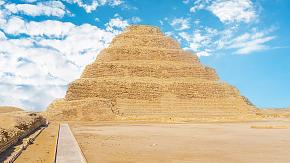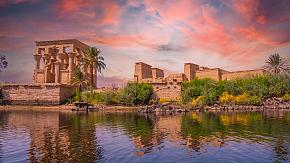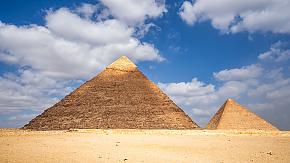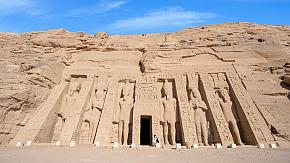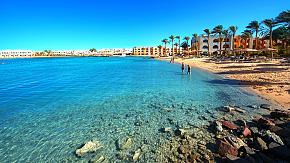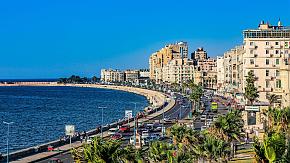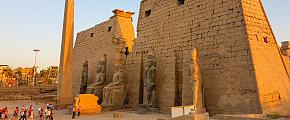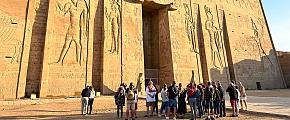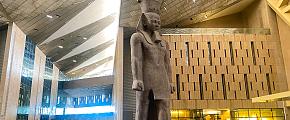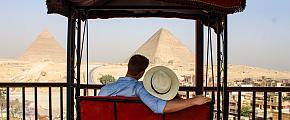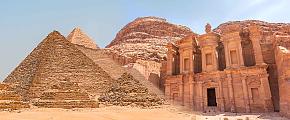Can You Go Inside the Pyramids of Giza?
"Can I go inside the Pyramids of Giza?" Most of you may have the same question when planning a pyramids tour in Egypt. The answer is YES. Entering ancient pyramids is undoubtedly a once-in-a-lifetime experience. But before you go, here are some important things you should know: tickets, costs, safety, and what exactly you will see inside.
Does It Cost Extra to Go Inside the Pyramids of Giza
Yes. The Giza Pyramid Complex entry ticket costs EGP 700 (about USD 15) per adult and EGP 350 (about USD 7.5) per student. This ticket covers entry to the scenic area but does not include entry inside any pyramid. Those all require separate tickets:
| Pyramid | Ticket for Adult | Ticket for Student |
| Khufu Pyramid | EGP 1500 (About USD 30) | EGP 750 (About USD 15) |
| Menkaure Pyramid | EGP 280 (About USD 6) | EGP 140 (About USD 3) |
| Khafre Pyramid | EGP 280 (About USD 6) | EGP 140 (About USD 3) |
|
||
What's Inside the Pyramids of Giza
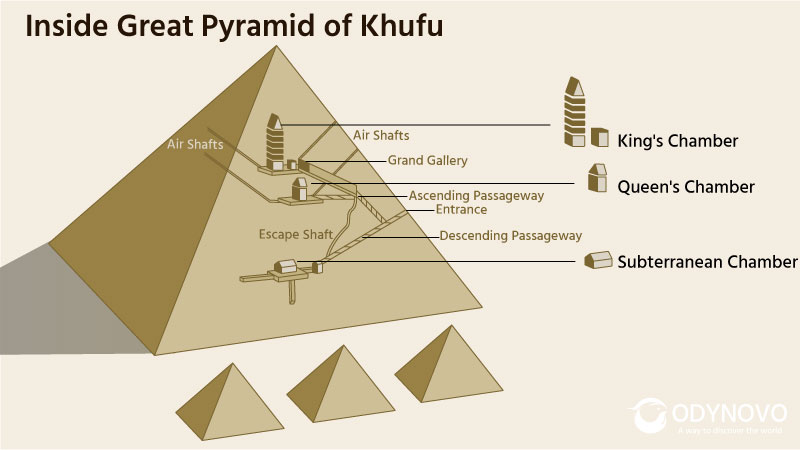 Inside the Great Pyramid of Giza
Inside the Great Pyramid of Giza
Many travelers imagine that the Great Pyramid of Khufu, the tallest and largest pyramid in Egypt (about the height of a 40-story building), must have vast chambers inside. In reality, it’s quite the opposite. Built from millions of tightly packed stone blocks, the pyramid leaves very little interior space.
Over the years, the entrance has been widened, with cement steps, iron railings, wooden boards, and lamps added to make the climb safer. Still, the ascending passage is narrow and steep, often less than 1.5 meters high and wide. Visitors must bend or crouch as they move forward, making the experience both physically demanding and immersive.
After about 20 minutes of climbing, you will arrive at the King's Chamber. Instead of golden treasures or glittering decorations, you will find only a single empty granite sarcophagus. The true thrill of entering the pyramid lies not in riches, but in standing within a structure that showcases the engineering genius of the ancient Egyptians.
What's Inside the Other Giza Pyramids:
- Khafre Pyramid: Smaller chambers but still impressive, with a simpler design.
- Menkaure Pyramid: More compact, easier to explore in less time.
Tips for Going Inside the Pyramids
Wear Sturdy Shoes
The interior pathways are uneven, with wooden boards and stone steps that can be slippery. Wearing comfortable, closed-toe shoes with good grip is essential. Sandals or flip-flops are not recommended, as they may increase the risk of slipping.
Avoid Backpacks
The tunnels inside the pyramids are very tight, sometimes less than 1.2 meters wide. Carrying a backpack will make it harder to move and can cause discomfort. A small crossbody bag or simply carrying essentials in pockets is a better choice.
Having Enough Water Before Going Inside the Pyramids
Water bottles are not allowed inside the pyramids, so be sure to drink enough beforehand. The air inside is warm and humid, and you need to do a lot of climbing, which may leave you dehydrated. Staying hydrated will make the experience much more comfortable. Also, remember to use the restroom before you begin your exploration, as there are no facilities inside.
Not Recommended for Young Kids or Elderly Travelers
The passages inside the pyramids are narrow and steep, often requiring visitors to crouch or bend for long stretches. With no windows, the interior can also feel hot and humid, making the climb much more physically demanding. For safety, it is not recommended for young children, elderly travelers, or anyone with mobility or respiratory issues.
 Narrow Passageway Inside Pyramid of Giza
Narrow Passageway Inside Pyramid of Giza
Best Time to Visit the Giza Pyramids
- Morning (8:00-10:00 AM): Cooler temperatures and fewer crowds.
- Late Afternoon (before last entry): Quieter atmosphere with softer light outside, which is perfect for photos.
- Avoid Midday: It's the hottest, most crowded, and most tiring time to visit.
The Pyramids of Giza are typically open daily from 8:00 AM to 5:00 PM during the summer months (April to September) and from 8:00 AM to 4:00 PM during the winter months (October to March).
However, these times may vary slightly, especially during public holidays or events. It's always a good idea to check for any updates before planning your visit.
Can I Visit the Giza Pyramids Outside Regular Hours?
Yes, but only with a special permit from the official authorities. The cost is significantly higher than a regular visit, but the experience is truly exceptional. You will enjoy the rare privilege of exploring the pyramids without crowds, surrounded by peace and quiet, and benefit from more in-depth insights from your private guide.
If you are looking for this luxury and exclusive opportunity, Odynovo can help organize your Egypt tour with it. Just remember that permits require advance processing, so it is best to book at least three months in advance.
FAQs About Going Inside the Pyramids
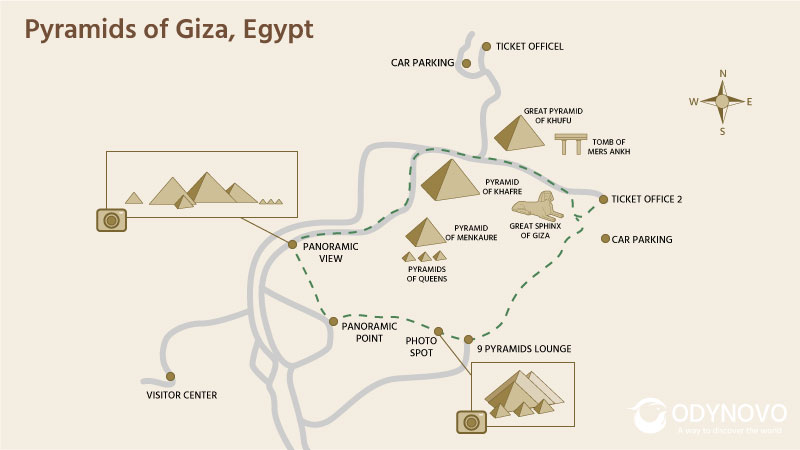 Map of the Pyramids of Giza
Map of the Pyramids of Giza
Can Kids Go Inside the Pyramids?
Yes, children are allowed, but it's generally not recommended for those under 10 years old. The narrow tunnels, steep climbs, and stuffy air inside can be overwhelming for younger kids. For younger travelers, it’s often more enjoyable to explore the pyramids from the outside. Activities like a carriage ride around the plateau usually capture their interest much more than going inside pyramids.
How Long Does It Take Inside?
Exploring the interior usually takes 30-45 minutes, depending on the crowd and how quickly you move through the passages.
Can I Take Photos?
Photography rules change often, check at the entrance. In most cases, cameras are banned inside. If you want to take a professional camera into the pyramids, you may need a special permit. So, your best bet is to take photos with your smartphone and turn off the flash.
Is It Worth Paying Extra?
That depends. If you're interested in ancient history or engineering, yes. Stepping inside pyramids will be a rare and unforgettable experience. However, if you're claustrophobic or expect treasures inside, you may prefer admiring the pyramids from the outside.
Any Other Pyramids that Can Go Inside to Explore?
Yes! Egypt has more accessible pyramids to explore inside beyond Giza Pyramids:
- The Bent Pyramid (Dahshur): You can actually go inside this unique pyramid, famous for its unusual shape.
- The Red Pyramid (Dahshur): Known as Egypt’s first true smooth-sided pyramid, it has larger, less crowded passageways than Giza, making it easier to explore.
- The Step Pyramid of Djoser (Saqqara): Recently reopened after major restoration, visitors can now enter parts of this oldest pyramid.
If you want fewer crowds and a more relaxed experience, Dahshur and Saqqara are excellent alternatives to Giza.
Are There Shuttle Buses in the Giza Pyramid Complex?
Yes, there are shuttle buses inside the Giza Pyramid Complex, and they are free to use with a valid entrance ticket. The shuttle runs about every five minutes in both directions, which make it easy to move between major sites. And all buses are accessible for travelers with disabilities.
Most shuttle buses have around 30 seats, while the section between the Pyramid of Khafre and the Pyramid of Khufu is usually served by smaller vans with 6-8 seats. If you prefer a more private and flexible way to get around, you can plan your Egypt tour with us. We can arrange a private golf cart inside the pyramid complex.
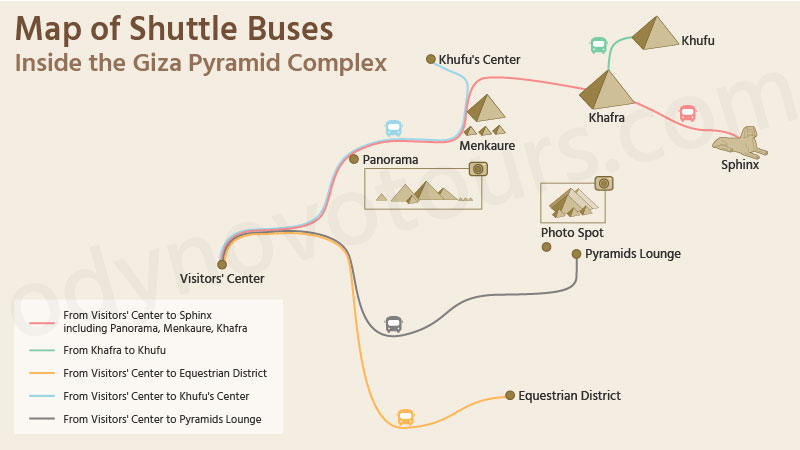 Shuttle Bus Route Map Inside the Giza Pyramid Complex
Shuttle Bus Route Map Inside the Giza Pyramid Complex
Where to Stay for Visiting Giza's Pyramids
There are many hotels to choose from near the pyramids, from budget to luxury. If you want to see the pyramids closely indoors, we can arrange a suitable hotel for you (such as the Marriott Mena House Hotel), from which you can directly enjoy the magnificent pyramids from the windowsill or balcony, and appreciate an extremely spectacular sunset. Incredibly, you will find that the sun sets at the back center of the pyramid. In addition to the super sunset, you can also watch the light show in the evening for free (of course, it won't be the same as the scene you spend money to watch).
What Can You See in the Giza Scenic Area at Night
There is a light show in the Giza Scenic Area at night, which is a wonderful program that cannot be missed. With rocks as the curtain, the lights tell the ancient legends of Egypt. The images on the rock curtain include statues of God, murals, and portraits of pharaohs and their wives, just like real people come into sight. With three pyramids in the distance as the background, the Sphinx is sometimes bright and sometimes dark under the flowing lights and changed colors.
Time: 20:30, 21:30, 22:30 in summer; 18:30, 19:30, 20:30 in winter
Explore the Mystery Pyramid With Odynovo
For anyone who is willing to explore more of the Egyptian pyramids, going inside the Great Pyramid of Giza is no doubt an essential experience. With a tailor-made trip, you can enjoy the journey at your own pace as everything is well taken care of. If you have any further questions about your Egypt tours, feel free to contact us at [email protected].
What Our Clients Say
Explore the latest verified reviews of Odynovo's travel services on Tripadvisor, Google, Trustpilot, Product Review and more trusted platforms.

